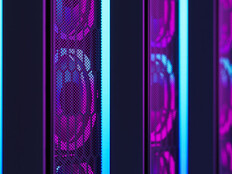Compellent SAN
Storage area networks are a necessity in today's enterprise server environments. The advantages they bring, consolidating storage across multiple servers and offering features and performance not available with internal server hard drives, are too compelling to ignore.
In the latest version of its Storage Center, Compellent Technologies has paired high performance with an easy-to-use interface at a reasonable price.
Advantages
SAN arrays generally offer substantial advantages over direct-attached or internal storage because they improve capacity utilization by sharing drives among multiple servers.
The Storage Center includes all the features and capabilities expected in a high-end storage system: synchronous (local) and asynchronous (remote) replication, tiered storage, snapshot functions and thin provisioning. But Compellent adds its own automated tiered storage tool, Data Progression, which automatically moves the most regularly used data to the fastest storage tier.
Why It Works for IT
This latest version really shows the maturity of the system.
New features in the latest version include support for solid-state disks (SSDs), 8-gigabit Fibre Channel and 10-gigabit iSCSI. The system is highly scalable, and can accommodate additional Fibre Channel or iSCSI interfaces as well as additional storage as needs expand.
The interface is highly intuitive, even when implementing the most sophisticated features of the SAN. Creating a remote replication pair, for instance, is just a matter of a few mouse clicks, which is much less complex than with many high-end storage systems.
Additionally, the system provides a high degree of fault tolerance, with dual controllers, automatic failover in the event of any hardware failure in the path, replication and automatic snapshot functionality.
The Storage Center also offers flexibility for integration in your data center. Compellent systems virtualize storage at the disk-block level. That means you can grow capacity incrementally. The more typical SAN virtualization is at the array-partition level.
Adding to this flexible build-as-you-go approach is its mix-and-match support for a variety of drives and connectivity protocols. Besides SSD, SATA, Fibre Channel and iSCSI, it also works with 15K and 7200 RPM serial-attached SCSI drives.
Disadvantages
There really are no cons. The Compellent system is high performance, sysadmin-friendly and provides a wealth of features. While the price may seem high when compared with internal hard drives, the ability to improve data access, availability and management should more than justify the price differential.
SSDs: Removing High-Performance Storage Bottlenecks
Solid state drives are the latest trend in enterprise storage, finding their way into storage area networks, servers and even appliances designed to sit between servers and SANs.
SSDs offer performance levels higher than the fastest hard drives, with lower power requirements. They are also more expensive than hard drives, so optimizing their use is critical.
Compellent incorporates SSDs into its Automatic Data Progression technology to ensure full utilization rates. SSDs are added to the array as a Tier 0, which is exceptionally fast. The progression feature migrates the most-used data to the SSDs, ensuring that important files are on the fastest media.








